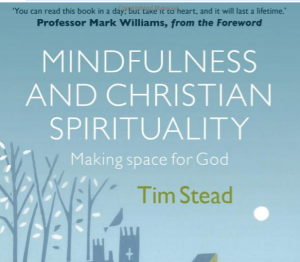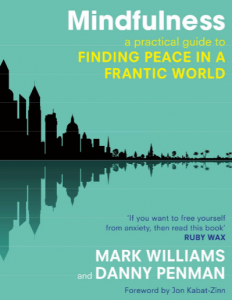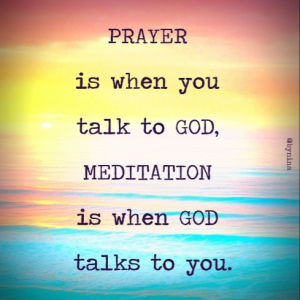I’ve been exploring the whole idea of ‘mindfulness’ in more depth recently.
There have been two books that have helped me with this, Mindfulness and Christian Spirituality by Tim Stead, who is an Anglican priest and Finding Peace in a Frantic World by Williams and Penman. This last one is described as a “life changing bestseller” and that is certainly written by well-qualified people who are leaders in this field and based on a lot of credible scientific research.



But as I am a fan of another, rather more ancient,”life-changing bestseller” (the Bible) I am interested to know what one might have to say about the other. Is mindfulness a helpful approach to life for someone who already has a faith perspective. Do the two things complement one another helpfully or contradict one another?
So this post is not about what mindfulness is – it’s a reflection on whether mindfulness is a good and useful practice.
I have heard mindfulness described as’spirituality for the nonbeliever’and I do think there’s an element of truth in that. So my question therefore is, is mindfulness a helpful practice for those of us who are believers? How does it intersect with the faith view of the world we already hold? What does it have to do with prayer?
Is mindfulness a helpful practice? And is it helpful for those of us who are believers?
My answer is a resounding YES, followed by a very small ‘but’.

Yes, absolutely, it is a good practise to learn. It is very definitely a practise of self-discipline for the mind. Just like a healthy eating regime is good for your body so mindfulness is an exercise regime for your mind. If you have a mind that jumps around like a monkey in a cage, firing off distress signals regularly causing you to become very anxious then mindfulness and its associated regime of meditation will undoubtedly help. It will help you lower your stress levels, it will silence the monkey it will allow you to be less driven by your anxiety. Keep practising it over time and you will become more aware of the negative self-destructive thoughts that lead you to spiralling downwards into an emotional state where eventually everything seems dark and impossible. Even if you are not an individual who is prone to anxiety, mindfulness will increase your creativity, make you far more aware of simple everyday pleasures and hugely increase the sense that you are actually living your life not just watching it go past you.
Those are all very big claims – I do totally recommend it, I am practising it myself, so why the very small caveat (the ‘but’ behind my YES)?
My biggest concern might not sound valid: It will ‘work’, it has many, many very tangible benefits. My concern is that it will work so well that you might miss, dismiss or generally never get round to the spirituality for which it creates space. You might decide that spirituality is not what you are looking for in which case you will still get huge benefit from learning about mindfulness and practising meditation.
Naturally my personal feeling is that that would be a shame because mindfulness is not the whole story. It also makes one assumption which I believe to be faulty: it assumes that once you’ve sorted out your wonky thoughts and compassionately accepted your negative emotions, once you have trained your mind then you will be able to be in touch with the ‘essentially happy and content person you really are at your core’.
You will be much happier and more content than you are now but there may not be a ‘happy and content person at your core’?
What if at the core of your being there is only a person who can’t find any peace because of something they feel guilty about or because of a sense of deep shame? Or what if, at the centre of you, you find an essentially lonely person who is very afraid and easily made to be anxious about everything? Or what if there is a person who is so chewed by anger about what life has thrown at them they can’t find anything about which to be ‘content’?
And, even if the person you find at the core of your being is none of those things, even if the person at your core could be described as ‘essentially happy and content’ it still leaves that person all alone at the centre of you, which is a bit lonely.

How does it intersect with the faith view of the world we already hold?
What Christianity teaches is that we were not made to be alone, we were made to find our deepest sense of joy and connectedness when we connect to the God who created us and loves us.
Faith in God inputs spirituality into a practice of mindfulness which is otherwise only physical (being still, becoming aware of your body and your breathing) and mental (learning to acknowledge the thoughts and feelings we have, learning that we can cut them down to size, that they do not have to control us).
Without a spiritual aspect to mindfulness we are still left alone in the universe-and if we are alone in the universe then there is no meaning to our lives. If we are alone in the universe then there is nothing beyond death. If we are alone in the universe, then we have no external objective source of truth. We have no-one to say over us “you are my beloved child with you I am well pleased”.
With only ourselves to tell ourselves that we are loved (or if we are lucky, a significant other to affirm this to us) then we are left propping up our sense of self-worth, security and significance by repeating a self validating mantra along the lines of “I am beloved”, “I am precious”, “I am valuable” and these things are true but you have to say that stuff pretty loudly if you want to avoid the inner critical voice saying “says who?”.
Plenty of humanists will tell you that you do not need an external source of validation to ascribe value to yourself but if we take away the word ‘validation’ and ‘value’, which sound a bit dry and psychological and simply use the word ‘love’ then it becomes pretty obvious that love is something you receive from an ‘other’. In fact, love is incomprehensible without there being an ‘other’. So if there is no ‘other’ in the universe then we are at best simply applying positive thinking and worst deluding ourselves.
Christianity offers us ‘The Great Exchange’: we offer to God our week and flawed selves, accepting that we are guilty (mostly of being unloving or self protective) angry and anxious. When we offer this self to God we are given back acceptance, forgiveness and an everlasting commitment to be our companion through life and beyond death.
Now that’s an incredible exchange which is why it would be a great shame if you missed it. Some Christians might reject mindfulness because it stops short of making this connection with God. And the truth is (as I’ve already said) that you might be SO amazed by the potency of mindfulness to change you that it will be tempting to think that it leaves no place or need for God/faith or spirituality and that would be a great shame because then you would be missing out on that connection which was always intended to be yours.

Mindfulness will create more space for God in your life. It will open a door and it is your choice whether or not to go through it. I do not think it will ‘open a door’ in any negative sense as in opening you up to harmful influences in the spiritual world (as a certain strand of Christians might fear although I suppose that depends on what you make the focus of your meditation), the main risk is that it simply opens a door to greater self-reliance which will take you away from God but it is equally likely to create a greater desire for God in your life. It’s a tool or a process, it all depends how you use it.
It will help you create a calmer mind and yes, I do believe that that what you most need is NOT simply a calmer mind, what you most need is to be connected to the divine presence that God offers you, but having a calmer mind maybe be a most useful way to create space for that connection.
We do not reject a diet because it doesn’t promise you peace of mind; a diet isn’t meant to do that, it’s meant to achieve weight loss. So why reject a helpful practice on the basis that it doesn’t necessarily offer you spirituality? It puts you in a place where you are more likely to become aware of God and that’s a good thing.
*****
When we practise meditation with the conscious awareness of being in God’s presence what we are doing is creating a less cluttered mind and in doing so we are making it easier to hear or sense the presence of the Holy Spirit.

To read the second half of this article (which is full of practical advice, reviews of mindfulness apps, prayer apps, and practical examples from Sheila Bridge) go to sheilabridgeblog.com . While you are there, why not sign up to receive Sheila’s future blogs and book reviews direct to your Inbox?
I’ve always been a bit hesitant to embrace the mindfulness movement, but reading this has opened my eyes to its potential (and clarified the hesitancy I’ve always had about it). Here at Activate Your Life, we’d love to hear your opinions and experiences of mindfulness. Is this a practise you can see being useful in connecting with your friends and community? Or are you more cautious in encouraging it, aware that people may not bother searching for the final piece of the puzzle? We’d love to hear your opinions and experiences of mindfulness. Contact us, or comment on social media.
This topic is one of many current issues you can talk about when you attend our AUTHENTIC annual weekend away. We’re laying ourselves bare for this one! Real, unfiltered testimonies, honest discussions about tricky issues, and, of course, we’ll ground the whole weekend in the truth of Scripture. As our theme verse states:
Nothing in all creation is hidden from God’s sight. Everything is uncovered and laid bare before the eyes of him to whom we must give account. (Hebrews 4: 13)
Thanks to Sheila, for sharing her blog post with us.


